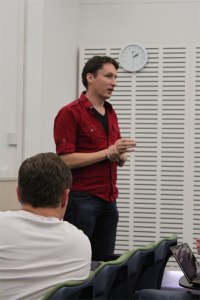 The UNSW Startup Games is a skill building program for an elite group of entrepreneurial students of UNSW to develop the ability to take their ideas into reality. The studentare from different faculities including computer science, engineering, medicine, psychology, design, industrial arts, business, and photovoltaics. It is co-ordinated by Joshua Flannery at New South Innovations and facilitated by Bart Jellema, a serial entrepreneur himself having started tjoos and now zeromail, who has been an active member in the Sydney startup community. He has run the Silicon Beach Drinks for that last four years and is involved in Startmate, a mentoring program which invests in the ideas of Australian business and gives them the tools to take it to Silicon Valley and pitch.
The UNSW Startup Games is a skill building program for an elite group of entrepreneurial students of UNSW to develop the ability to take their ideas into reality. The studentare from different faculities including computer science, engineering, medicine, psychology, design, industrial arts, business, and photovoltaics. It is co-ordinated by Joshua Flannery at New South Innovations and facilitated by Bart Jellema, a serial entrepreneur himself having started tjoos and now zeromail, who has been an active member in the Sydney startup community. He has run the Silicon Beach Drinks for that last four years and is involved in Startmate, a mentoring program which invests in the ideas of Australian business and gives them the tools to take it to Silicon Valley and pitch.
The week before the program started, Bart encouraged all the teams to curate their online presence on their blogs, twitter and especially Facebook. Networking is essential part of entrepreneurship. On the Thursday before the official start, the group met at Silicon Beach Drinks and met with other local entrepreneurs and those just starting out. Apparently this real face-to-face networking is still a vital part of networking for budding entrepreneurs.
The games officially started on Saturday, 6th April in a UNSW lecture theater. Bart introduced himself and gave some background on how he got started. He finished high school but did not go to university. He noted that the smartest people in society are encouraged to enter a profession such as medicine or law, however, he urges smart people to become entrepreneurs so they can change the world.
Participants were then invited to introduce themselves from the front of the class. Bart guided the class to customise the learning outcomes for the program by asking participants to indicate by show of hands who was familiar with different topics. Each learning outcome was written up so that Bart could highlight the essential parts and customise the program depending on where the participants were currently and what they were interested in. Some of the themes included lean startup methodology, financials, finding mentors, incubators, pitching to investors, risk, focus, face-to-face communication, presentation skills, and social networking.
Before the lunch break, Bart asked us to identify people in the startup community (local and abroad) that participants would like to meet. I was assigned Peter Diamandis who runs the X Prize Foundation, an organisation which offers large cash incentive to encourage inventors to solve grand challenges like space flight, better medical devices, and genetic deciphering technology. A current challenge is called “Archon Genomics X PRIZE” which will ward $10m to someone who can build a device which can sequence 100 human genomes within 10 days. The challenges are always specific just beyond our current grasp but if solved with lead to exponential technologies. A previous challenge included an fast and effective oil cleanup method. Peter founded Zero Gravity Corporations which inspires people to work towards space flight – it has actually been covering zero gravity flights since 2004 and Space Adventures which has announced the plan for sub-orbital and flights to the moon. The “Tricorder X PRIZE” sounds like something out of star-trek – it is a small device that would better diagnose and treat patients. After the break the participants had to give a presentation of what they had found out about their assigned person of interest. Other people of interest included Eric Ries, and Steve Blank.
The next game involved picking two random words, turning them into a .com and then pitching it to the group which was a lot of fun. This sort of drill puts people far outside their comfort zone, they have to spontaneously improvise a business from those two words and pitch it to the group. People were encouraged not to think about it too much and just come to the front to pitch for a few minutes. This highlighted just how much talent and creativity there was in the room. It gave an opportunity for those less confident to shine.
At the end of the day, the group continued to a local establishment for “speed networking”. We found a quiet spot in the bar and put together several tables. What followed was a cross between speed dating and networking where each person two minutes to get to know the others better.
The program was promoted as a way to build your skills, meet people and have fun in the process. So far the program has far exceeded these expectations. I’m eagerly anticipating what’s coming up next.